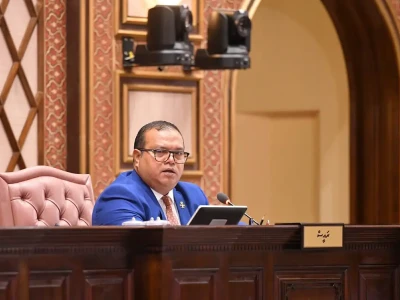
Top Court issues stay order on impeachment amendment
The Supreme Court issued the interim order by a majority of five judges hearing the case. Three judges supported this view, while two dissented.
By
Fathmath Ahmed Shareef
The Supreme Court on Thursday issued an interim order not to implement the amendment to the parliament rules that allows the removal of the President or Vice-President with less than constitutionally mandated number of lawmakers in parliament.
Attorney General Ahmed Usham filed a constitutional case in the Supreme Court on 28 December seeking to quash an amendment to the parliament rules of procedure that allows the removal of the President or Vice-President on the basis of the number of lawmakers present at the given time in the parliament. The Supreme Court on Thursday issued an interim order to stay the implementation of the amendments until a verdict is reached in the case.
"The majority of the judges hearing this case direct the Parliament not to apply the amendments to Article 49 (g), (h) and (i) of the Parliament Rules for the time being”, the Supreme Court’s order on Thursday said.
The Supreme Court issued the interim order by a majority of five judges hearing the case. Three judges supported this view, while two dissented.
Justice Azmiralda Zahir, who supported the stay of implementation of the amendments, said:
-
The general rule is that the courts do not have the authority to settle a decision or action of the Parliament
-
The exception in this case, however, is that the courts have the opportunity to hear cases in which the Parliament is also accused of acting in violation of the Constitution
-
The case filed raises a constitutional debate
-
Since decisions based on the political question are matters over which the courts do not exercise jurisdiction, according to the amendments, the courts will not be allowed to subsequently overrule the decisions of the Parliament
-
However, when even a rule of Parliament cannot act unconstitutionally, there is a possibility of losing relevance on the subject matter of the case unless an interim order is issued before a final judgement is rendered in this case
-
The amendments to the Rules of the Parliament should be suspended in case legal questions are raised and they are alleged to be illegal
"This is because in cases where every sitting held under the amendments to Rule 49 of the Parliament is convened and decisions are taken in accordance with the provisions of Articles 86 and 87 of the Constitution, it is felt that the procedure followed by the Parliament from the outset should continue till a decision is taken in the matter raised or the court directs otherwise. This is a situation where an interim order needs to be issued in order to protect the public interest," Azmiralda's opinion said.
The opinion was supported by Justice Mahaz Ali Zaheer and Justice Husnu Al Suood.
Aishath Shujoon, who differed with this opinion, held that there were no circumstances for an interim injunction because she could not insist that the application satisfies the requirements of an interim injunction before it can be issued in a constitutional matter.
In her opinion, the requirements of the proposal were not satisfied:
-
The case was received by the court more than one month after the date of passage of the amendment
-
The Attorney General has not mentioned that a case relating to the impeachment of the President has been filed in Parliament and no such evidence has been submitted by the Attorney General to the Supreme Court
"This is a motion based on the possibility of future unconstitutional circumstances and such a motion may interrupt the subject matter of the case if an interim order is not issued before a final judgement is issued without giving the respondent an opportunity to speak. And I find it difficult to accept that it is a situation that requires temporary action”, Shujoon's opinion read.
Justice Mohammed Ibrahim supported Shujoon’s view.
According to the constitution, two-thirds of the total votes of the parliament are required to remove the president or vice-president. The total strength of the current parliament is 87. Therefore, 58 votes would be required to remove the president and vice-president.
The MDP, which has a full majority in parliament, amended the rules to count the number of members in parliament at the time.The three amendments to the rules are:
-
1-
49 (g) - For the purposes of this rule, the total number of members of the Parliament remaining in office at the time shall be considered in computing the total number of members of the Parliament.
-
2-
49 (h) - If a seat in any constituency becomes vacant other than due to the expiry of the term of the Parliament, that constituency shall not be counted in the calculation of the total number of members of the Parliament until a member is elected to that seat.
-
3-
49 (i) - If there is a change in the total number of members during the age of the current Parliament, the Speaker shall announce it at the earliest session of the Parliament.




